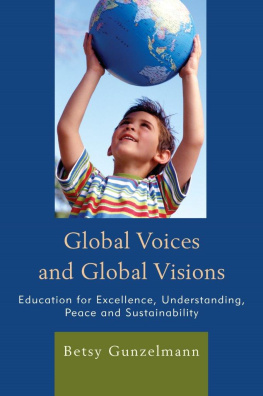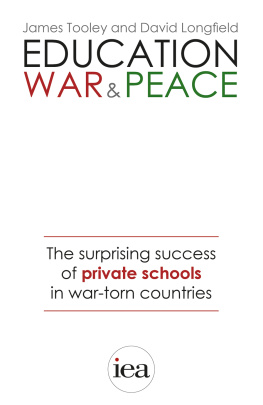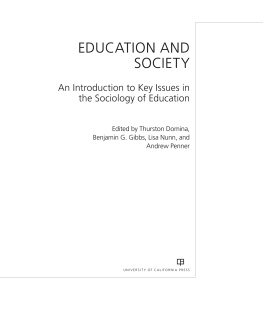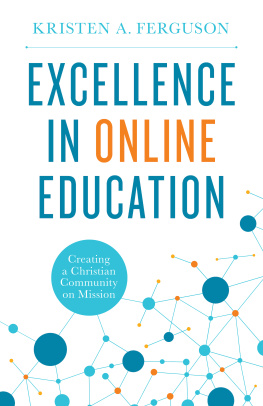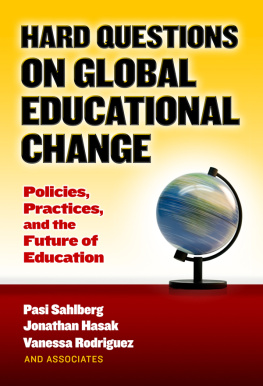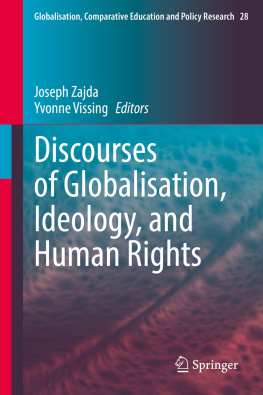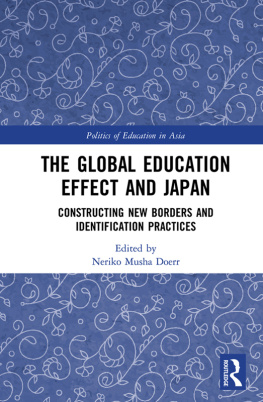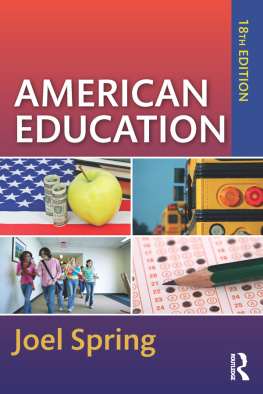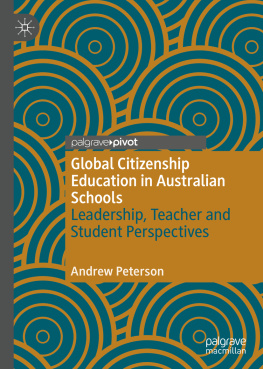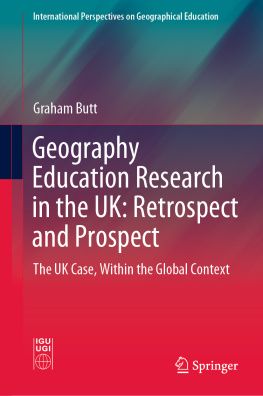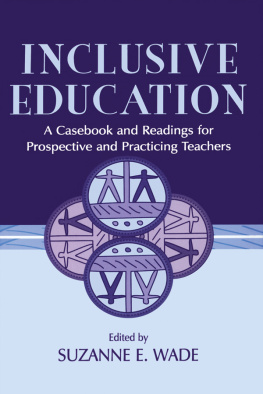Acknowledgments
There are so many people to recognize for their contributions to the writing and research of Global Voices and Global Visions: Education for Excellence, Understanding, Peace and Sustainability . To begin with I want to thank the Southern New Hampshire University Community for their continued encouragement; specifically, Dr. Paul LeBlanc, President of SNHU and his administrative team, and Dean Karen Erickson have been exceptional mentors during this project. And a very well earned thanks to our Graduate Student Assistant in the School of Arts & Sciences, Ben Gentry, who was able to untangled and format this manuscript.
Also, the SNHU student researchers deserve a special mention for their dedication, enthusiasm and belief that our work can make a positive difference in our world. My student research team was made up of undergraduate psychology students including Ashley Bachelder, Noelle Bourgeois, Rachell Burrell, Russell Dudas, Ashley Gargano, Joshua Heyman, Heather Huntington, Angela Jackson, Lauren Lorenz, Andrea McMaster, Amanda Meenan, Lindsey Monti, Allysa Moriarty, Stacie Rivard, Nicole Sanborn, Lauren Twombly, and Tina van Loendersloot.
Of course none of this would have been possible without the team at Rowman & Littlefield. To Dr. Tom Koerner, I am most grateful for his continued support of my work and for his vision and understanding within the field. To team member, Carlie Wall, I am most honored to have had your support throughout this project and your magic with making the cover of this book shine. Also, Christopher Basso, has worked tirelessly with page proofs and bringing this work to fruition.
So too, I must express my appreciation to my friends for their patience and interest in this work. Their technical assistance, insight and willingness to listen to my ramblings demonstrate their true friendship and caring.
Finally, I want to thank my son for his understanding, interest, and patience with this project. He has grown into a very bright, insightful and caring young man who demonstrates many of the values of an outstanding globally engaged student.
A sincere thank you to you all!
Chapter Eight
On Economic Issues
Education is both the key driver of economic growth and a key social equalizer in our current knowledge-based economy.
Barbara Ischinger, OCED Director of Education
The economic issues are another critical interrelated piece of the puzzle when we are developing an educational system for excellence. The economic parts are related to societal, cultural, and governmental issues and directly impact the educational aspects as we shall see in the upcoming chapters. Presently we are confronting a worldwide economic crisis, one that has numerous causes and, thus far, no simple or quick fixes. So too, it is with the educational predicament we face; it will take time, research, collaboration and funding to attain academic excellence.
Of course, all countries need to be careful with how their money is spent, but certainly there is no more important need than the educational excellence of children. This should be a top priority of all nations concerned with establishing or maintaining economic security for the future.
Todays youth must be well prepared for competing in the world job market and ultimately for supporting long-term economic growth and stability. Thus, schools need to prepare students differently to meet the needs of our global economy. This means that students still need to have a solid foundation in basic skills, but education must go much farther by also preparing them with high-level cognitive skills, innovative, problem-solving abilities, along with expertise in collaboration and social skills.
Business needs are real and immediate for the twenty-first century. It is only through the necessary education that we can prepare our children to meet these needs. Bill Gates, founder of Microsoft, also believes that education is the key to preparing youth with the knowledge and skills needed in our rapidly changing world. (Gates 2007) An international education focus is essential in order to develop the necessary understanding and level of excellence to be able to work collaboratively.
Yet, there are more reasons to attain academic excellence than just maintaining economic stability. There are the human aspects; the concern and interest in fellow humans (and animals), and the ethical and moral issues of living in our global society. The need to work together to innovatively and effectively solve world problems including inequity of education, global climate, the world health crises, poverty, global disasters, and atrocities requires not only math, science, and technology skills, but also the crucial liberal arts and language skills that help to fully enlighten the educated person.
There are many good researchers and educational reformers, all with differing data and solutions. The problem is who do we believe? When I first began researching this topic I was amazed to find so much information and strongly stated solutions from the business world and the economists. Certainly these experts can offer much on the financial issues, and even on some of the skills needed for related careers, but educating children is not the same as running a business. The perspectives from numerous fields including education, child development, health related fields and the psychology subfields of learning, motivation, cognition, and neuro-psychology are essential. Thus, I may interject periodically the research from such specialists in light of the global voices on the reality of what actually takes place educationally.
Hanushek (2008) is an excellent resource when talking about economics and education, but he tries to simplify educational problems to an economic equation. No doubt economics plays a significant role in the difficulties of poor academic achievement, but there are numerous other factors involved in deciphering the reasons one country is excelling while another is floundering. Focusing mainly on the economic matters distracts from many of the more challenging issues involved and detracts from humanitarian values and cultural concerns; it overshadows the voices of the many people to whom we must carefully listen: the teachers, the students, and all involved with education. It is these voices I am committed to helping get heard throughout Global Voices and Global Visions.
FUNDING OF EDUCATION
Most thriving countries are spending a high percentage of their GNP on education. Most have made increases in the last several years as well, despite a difficult global economy, wars on terrorism, natural disasters, and so on. Government funding for the education of our children should be a top priority for all governments. During these economically challenging times this should be an even higher priority as it is in many nations.
Peoples Republic of China: The overall funding of education in China is seen as essential to the society. It is compulsory for all children and adolescents in the Republic of China to attend nine years of education. No tuition or fees are charged for the compulsory years (Ministry of Education, Republic of China, May, 26, 2009, Article 2). Funding sources are mostly from government appropriations, supplemented by other sources of raised funds (Ministry of Education, Republic of China, June 29, 2009, Article 52).
While in other educationally soaring countries such as Singapore, all children are allowed free state education, and all schools receive some level of public funding according to the National Center on Education and the Economy (NCEE, Center on International Education Benchmarking, n.d.). Funding is administered directly by the central government in Singapore with schools classified as either government or government-aided. Government schools are fully funded, while the aided schools, which are usually religious in orientation, receive only partial government funding, although this can be up to 90 percent (NCEE, Center on International Education Benchmarking, n.d.).
Next page
